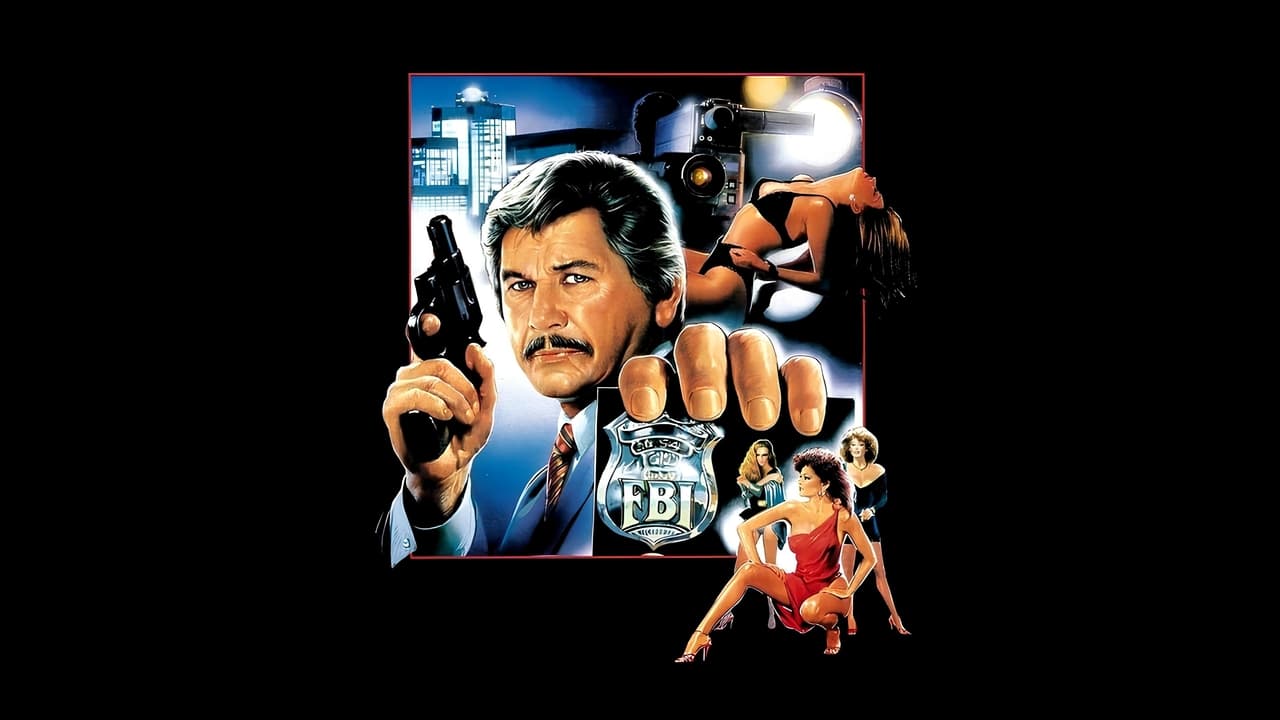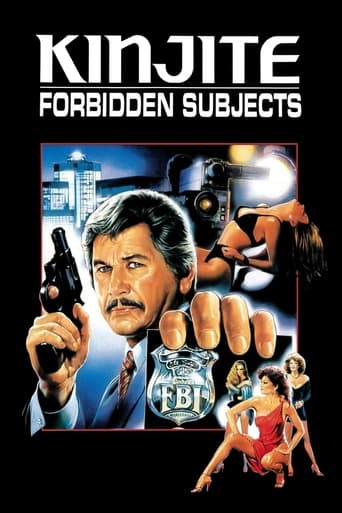Michael_Elliott
Kinjite: Forbidden Subjects (1988)*** (out of 4) An L.A. cop (Charles Bronson) tries to bring down a pimp (Juan Fernandez) who has been taking underage girls and forcing them into prostitution. While all of this is going on, the cops racist attitude begins to come out when his daughter is molested by an Asian man on a bus. Before long the cop is searching for an Asian girl who is in the possession of the pimp but he doesn't realize she's the daughter of the man who attacked his.KINJITE: FORBIDDEN SUBJECTS really did have a lot "lasts" to it. It was the last film that Bronson made for Cannon and it was also the last film directed by J. Lee Thompson. The two men had a pretty long-running career together and while critics weren't overly happy with their film selections in the 80s, they certainly made some memorable action movies for fans. This one here is without question one of the strangest because it almost seems like they took a bunch of material that was cut out of previous movies and threw it all in one pot and out came this thing. Even critics who hate this movie admit that it's extremely well-made but at the same time there's no doubt that the subject matter is something that's going to turn most people off. As Roger Ebert said, child molestation and rape is perhaps a subject for a more serious movie.I used to feel that the exploitation level of the movie really hurt the film. There's no question that it's rather uneven and especially at the start when you laughing and having a great time seeing Bronson beat the crap out of people and threaten others. These scenes are a lot of fun because, well, it's just great fun seeing Bronson bash these bad guys. The film takes a very dark and rather dramatic turn once the main storyline gets going and from here we're in for a well-made thriller that actually works quite well. Again, the nasty elements of the story probably should have been in a more serious movie but there's no question that this is a rather good movie.The performances are actually a major plus here with Bronson actually doing more than just beating people up. I really do feel that he gives a real performance here, which can be seen during one sequence where he's talking to a priest and another when he's dealing with his racist attitude. Perry Lopez is good in the role of his partner and James Pax is also very good in the role of the Asian father. You've also got Amy Hathaway good as Bronson's daughter and you can also spot Danny Trejo and Nicole Eggert in early roles. Then there's Fernandez who is simply downright sleazy and creepy as the worthless pimp. The guy just oozes pure scum and the finale, which I won't ruin here, is just perfectly done.On a technical level this is the most impressive film from Bronson's Cannon period. The film looks to have been shot on a much higher budget than normal and the director manages to bring a nice flow to the film. There's some pretty good action scenes scattered throughout but, as any Bronson fan knows, the real entertainment comes from him punishing the bad guys. KINJITE: FORBIDDEN SUBJECTS isn't the easiest movies to watch because of the subject matter but it's certainly an entertaining one.
AaronCapenBanner
Charles Bronson plays an L.A. police Lt. named Crowe whose teenage daughter was molested on a subway train by a visiting Japanese businessman, though the tables are turned when that same businessman's daughter is kidnapped by a pimp named Duke, and sold into child slavery. So of course Crowe,(who hates the Japanese) is assigned to the case, not knowing that it was this very businessman who touched his daughter. Crowe is determined to break up the slavery ring, and get Duke, not matter the cost.Mostly routine film does have some ironic aspects to it that don't pay off, merely plot contrivances. Not really as offensive as it sounds, but still a lurid and sad look at this vile industry. Final scene is certainly memorable, though you may wonder if Crowe went too far...
kols
For Golan-Gobus and I can only think it was produced as a favor to Bronson who, by 1989, had perhaps suffered brain damage from too many "Death Wish" movies (actually he was very effective in "Yes, Virginia ...", 1991, so maybe not).Whatever, here he's a cop unloading tons of vigilante-style justice to a lot of bad guys in what is a very boring paranoid's, or bullied 9-year-old's, wet-dream.What makes it boring is that everything is a set-up, predictable and poorly depicted. Same with the dialog: almost a parody of tough-guy-cop-gone-over-the-top movies. But none of the action scenes, non-action scenes, dialog, pacing, or acting rises to that level. Just a really bad and pointless waste of film.
Robert J. Maxwell
In some ways I'm glad I saw this film. For one thing, I learned how to pronounce the title correctly. "Kinjite" mean "forbidden" in Japanese and the accent is on the first syllable, not the second.It's an ambitious film too, with a moral lesson built into it, that we are all brothers and sisters under our differently colored skins. Further, Charles Bronson is not his usual typical action hero. He's a flawed detective. He's prejudiced against the Japanese who, he believes, are taking over the country. He steps out of his police car and shouts epithets and orders harshly at a gaggle of polite Japanese tourists whose cars are blocking the street. "You think you OWN the place!," and so forth. The picture was released in 1989. Michael Creighton's novel, "Rising Sun," appeared at about the same time. That was when the mania about Japanese business practices was at its height, and shortly before the Japanese economy imploded and sank to the bottom of the aquarium, where it rests, gasping, today.The plot has two strands that come together towards the end. In Tokyo, a naive, young Japanese businessman, Karuko, lives in a companionate marriage with his sensitive, intelligent wife and innocent ten-year-old daughter, Fumiko. On a crowded subway he watched an attractive lady being felt up by some pervert and she seems distressed, signs he interprets as an orgasm rather than humiliation.Karuko moves with his family to Los Angeles where his daughter is kidnapped, gang-raped, and forced into whoredom by a nefarious Latino named Duke. But before that happens, he finds himself on a bus in Los Angeles seated next to Bronson's fifteen-year-old daughter. Still believing that young girls like to be secretly felt up in public, Karuko slips his hand under her skirt. She shrieks and runs off the bus with her friends. "What happened?", they ask her. "Some Asian guy touched my holy of holies," she says, brushing the incident aside with a quip.Bronson and his partner, played by Perry Lopez, whom you may remember as Lieutenant Escobar in "Chinatown," are assigned to the case. Bronson begs to be reassigned. He hates Asians and wants nothing to do with them. But one of those blustering, no-nonsense superiors chews him out and sets him and Lopez on the case.It's during his interview with Karuko and his wife, when Karuko breaks down and sobs, that Bronson's prejudice begins to melt. Bronson and Lopez finally recapture Fumiko and return her to her family but her shame is boundless and she commits suicide. Now Bronson goes after Duke with a vengeance and the film ends with an explosive and bloody shoot out on the docks at, I think, San Pedro.It's easy to see how this could have been an effective movie, full of action, suspense, and yet provocatively done. But it largely fails. I don't know exactly why. Part of it is probably due to the cheapness of Golam and Globus, the producers. They have a reputation in the industry. They're like characters out of Dickens, chuckling as they count out the pennies they managed to save today. If a scene calls for a full lawn, instead of calling in a greensman, they sprinkle the lawn with green confetti. (That example isn't made up.) Bronson couldn't have cost much. By 1989 he was no longer the strapping ex-miner with the chiseled face and bronze pectorals of his youth. And he was sometimes enjoyable but rarely a performer to be taken seriously. Perry Lopez, with a respectable career in supporting roles behind him, has aged until he's almost unrecognizable -- not his fault, to be sure -- and puts virtually nothing into the role. The Asians can't act, with the exception of Karuko's wife, who is convincing. The role of Duke, played by Juan Fernandez, is strictly one dimensional. He's pure evil. Not colorfully evil. Not suave or anything. Just a tattooed and perverted Beaner as far as this movie is concerned.The plot is clumsy and without subtlety, a disappointment considering its potential. It was written by Harold Nebenzal, whose primary career was in production, not writing. Shifting as it does between Tokyo and LA for the first half hour, with no connection between the two, leaves a viewer feeling as if he's fighting his way through a thicket of thorns, hoping it will all turn out okay in the end. Director J. Lee Thompson, responsible for "The Guns of Navarone" and other epics, was pushing eighty and his best films were behind him.Yet there are some moving moments in it. There can't help but be. Karuko finds himself in a position where he must thank the Bronson family for finding his daughter. He brings a present for Bronson's own blond teen ager, the one he fondled on the bus. And it's an exquisite doll of a Japanese woman in traditional dress, encased in a glass box. He recognizes her and she recognizes him, but neither says a word about the incident.And the scene is which Fumiko takes a lethal dose of pills, then arranges her colorfully clad little body on the bed and waits to die is poignant. She and her kimono remind us of the doll in the glass case, both pretty, both easily shattered.

